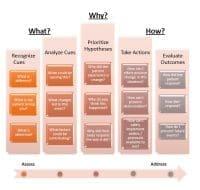How many years ago did we take an ethics class in nursing school? Do you remember the Code of Ethics for Nurses with Interpretive Statements (the Code)? It’s not unusual for the Code to fade from our minds once we graduate from nursing school and plunge headfirst into the world of nursing, ready to care for people and save lives. We become busy with our jobs, families, and life in general. Slowly, some of what we learned, the material we do not use daily, can become vague memories, until we remember the concept, but not the details. I want to share my story of how, in the context of my duty to patients, I have revisited the Code and found it to be a valuable guide.
Events in the past several years of my career have caused me to reflect on my nursing school ethics classes and the Code. I was in such a quandary that I read the online read-only version, purchased a hard copy to be mailed, and, because time was of the essence, purchased the electronic copy for immediate download. I studied, reread, highlighted, tabbed pages, and underlined text. I reached out to former professors and mentors for advice. In the end, that gut feeling I had initially did not fail me; something was terribly wrong, and I was required to do something about it—to advocate for patients and their safety. I know that must sound easy, to just do the right thing, what’s the big deal, right?
But it is a big deal. In society today, some organizations don’t value people who speak up to “do the right thing”, and they don’t honor whistleblower protection laws. Instead, they retaliate, they bully, they run people off, and they fire people. In addition, given that many people are are unemployed, furloughed, working reduced hours, or staying home for safety during this pandemic, putting your job on the line by speaking up is unnerving.
One might ask if the risk is worth it. Let’s really look at that question, what is the “it” in “is it worth risking your job”? The “it” is often a patient’s unnecessary illness, communicable disease exposure, fraudulent documentation, questionable billing practices, a preventable code situation with a child, thousands exposed to potentially unsterile instruments; the “it” can be someone’s life.
With that understanding, one might still ask of it makes sense to risk your job to do the right thing. But what exactly is the “right thing”? Is it reporting the concern to your supervisor, going further up the chain of command if your supervisor fails to act, voicing and emailing concerns in committee meetings, writing the CEO, reaching out to other professionals and colleagues, or “going with the flow” and taking no action. How do we know what the right thing may be? Except for going with the flow, I did everything listed, multiple times.
For example, I discussed the ethical issues ad nauseam at the nursing manager meetings. I heard the common comments, “oh yeah it’s bad here, has been like this forever”, “they shouldn’t get away with this, but they do”, “I don’t know how you do it, that’s tough”, “that’s why they can’t keep anyone good-you’re too smart”, “they probably don’t know what to do with you-no one has challenged them on anything before”, “you just need to learn to play politics better”, “nothing’s going to change, just move on”, and “you need to learn to just go with the flow”.
When none of the approaches worked, I didn’t know who to turn to for guidance. That’s when I bought the Code and downloaded an instant copy to print and peruse that night.
I lost sleep during the months as my situation evolved and eventually gained a new diagnosis, hypertension. Some may think it couldn’t be that hard to know what to do after reading the Code, but the document provide guidance, so you still need to think through the best course of action and the consequences of that action. Here are some key points in the Code that I found helpful:
- Provision 2 | The nurse’s primary commitment is to the patient, whether an individual, family, group, community, or population (preface, v)
- Provision 3 | The nurse promotes, advocates for, and protects the rights, health, and safety of the patient (preface, v)
- A code of ethics for the nursing profession makes explicit the primary obligations, values, and ideals of the profession. In fact, it informs every aspect of the nurse’s life (preface, vii)
- The Code of Ethics for Nurses with Interpretive Statements serves the following purposes (preface, viii):
- It is a succinct statement of the ethical values, obligations, duties, and professional ideals of nurses individually and collectively.
- It is the profession’s non-negotiable ethical standard.
- It is an expression of nursing’s own understanding of its commitment to society.
- When error occurs, whether it is one’s own or that of a coworker, nurses may neither participate in, nor condone through silence, any attempts to conceal the error (pg. 12).
- When incompetent, unethical, illegal, or impaired practice is not corrected and continues to jeopardize patient well-being and safety, nurses must report the problem to appropriate external authorities such as practice committees of professional organizations, licensing boards, and regulatory or quality assurance agencies (pg. 12).
- Reporting questionable practice, even when done appropriately, may present substantial risk to the nurse; however, such risk does not eliminate the obligation to address threats to patient safety (pg. 13).
These are sections I reviewed many times after completing my first reading of the Code. Upon finishing, I ruminated on the many events that had transpired, the questionable actions and responses by leadership, the bullying and intimidation practices, the retaliation, and the lack of support. Most importantly, I thought about the patients and families. Then, I wept. I wept because I realized just how long this had been happening, how complicit my colleagues had become, and how many patients and families had suffered because of these practices. I wept because I knew what I had to do, because I knew what position I would be putting my family in, and because I was the only one willing to do what was necessary, what was required and what was obligated of me as a nurse. I had to resign.
It has taken over 6 months for me to begin to recover from this experience; the first sign is sharing this story. I didn’t work for 6 months following my resignation due to relocating during this pandemic and taking steps to start over in a new location. I also wanted to take the time to carefully vet potential employers to find an employer and supervisor whose integrity and commitment to patients and our Code mirrored my own. I read reviews, feedback, ratings, reports, and anything I could find to interview potential employers and supervisors. I finally found an organization that felt right and a supervisor who listened to my questions and supported me, all in the best interest of our patients.
Most of what I experienced happened pre-COVID-19. Now that we are in the middle of this pandemic, times are more challenging than ever. Difficult decisions and situations face nurses and our fellow healthcare workers daily. We are living in a time when our ethics are challenged. We have a guiding document to help us through this and we have each other and our shared voices. It’s time to use them all, together, to do the right thing. It’s what we are obligated to do.
“The Code of Ethics for Nurses with Interpretive Statements is a reflection of the proud ethical heritage of nursing and a guide for all nurses now and into the future” (preface, ix). If you haven’t read this vital guidance for nursing practice, I encourage you to dedicate some time to do this now and let it guide you to do the right thing. (View the Code here)
Kimberly Madden is a nurse manager living and working in Washington State.



















1 Comment. Leave new
Excellent article. Now is definitely the time to be the voice our patients’ need. We can’t and shouldn’t stand by and be silent.